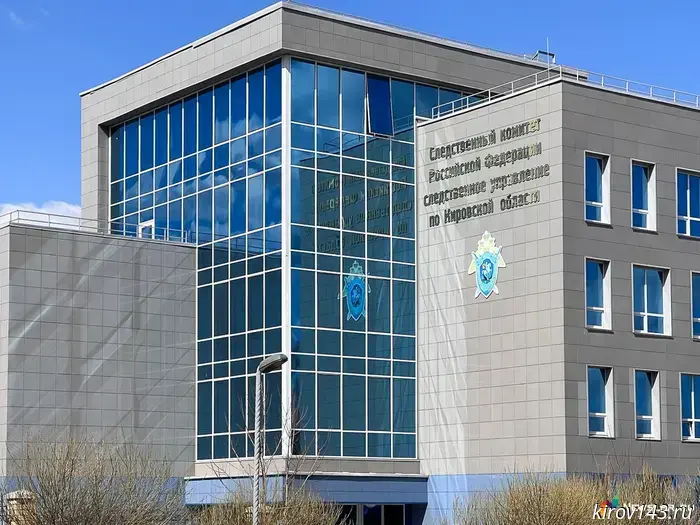
Kirovsk Sports Club left "headless": Vinogradova was forced into retirement
The retirement report was filed "at personal request" back in early June, although in December 2024, Vinogradov's term of service was extended for the next five years. As for the "self-written resignation" of the general, subordinates link it to the results of the Moscow inspection: "Three days, three people worked," which concluded with probable findings of "bureaucracy," "unreasonable delays in investigations," and "procedural violations."
The inspectors allegedly also noted excessive tolerance of the investigation towards officials involved in embezzling public funds and assets, abuse of authority, and creating obstacles to the development of entire sectors of the regional economy (presumably road, forestry, and construction). Although the Investigative Committee was not as "obviously close and friendly" with regional leadership as regional prosecutor Andrei Oborok, who completely left his position at the beginning of May.
We lost two generals without tears
The "removal from office" of the regional prosecutor Andrei Oborok was met in Kirov with greater anticipation and enthusiasm than with surprise. Since, from the moment Alexander Sokolov became governor, the prosecutor's office probably became "deaf," not wanting to hear or respond to critical remarks from deputy Albert Bikaluk about the regional leadership. Despite the fact that Bikaluk has never in his entire life uttered so many words like "crooks" and "corruption."
It can also be assumed that the agency subordinate to Oborok, perhaps, forgot how to read, or more precisely, how to read Newsler.ru, where not only reports about probable and actual "schemes" were published but also documents were named, and the path to collecting evidence for at least initiating pre-investigation checks was outlined (even considering a Presidential decree, a media publication is not an official request). Thus, many Kirov residents, judging by readers' appeals, perceived Oborok's appointment as the "chief anti-corruption officer" in the Sverdlovsk government as nothing more than a joke.
However, the resignation of Andrei Vinogradov more deeply shook his former subordinates, who supposedly celebrated July 2 as a "holiday." Interestingly, when asked by the editorial office why they hadn't shared "internal, spicy, and sensitive intra-departmental events" earlier, one interviewee said that it was not honorable to "talk about the general." Now, there is nothing preventing them from speaking about the former head—now "a shot-down pilot."
According to the interviewee, during Vinogradov's five-year leadership of the regional department, he managed to achieve only one thing: the rating of the Kirov Investigative Committee "plummeted into the toilet":
"Under Grigory Zhitinev, the Kirov agency ranked 1st to 3rd and never once dropped out of the top five best departments in Russia. When Airat Akhmetshin came, he didn't reduce the rating pace and only received praise from leadership. But Vinogradov, in just his first year, managed to go 'below the baseboard' and steadily fall to the very bottom of the internal list of the 'best in Russia.' So, after two or three years, all the specialists from the Investigative Committee, seen as the 'heaviest boss,' rushed to retire. An attempt was made by a personnel commission from Moscow to stop this, but unsuccessfully. Today, young boys and girls with new diplomas sit in offices, and it will take many years for them to master even the basics of this complex work."
As the interviewee explained, when he said "the heaviest boss," he meant not only Vinogradov's professional qualities but also his personal ones:
"He really hampered the agency's work with endless meetings. Not just hampered, but paralyzed. You’re rushing to a service—important tasks are piling up, and then you're told there’s a murder. But no, order—show up... Two hours with the whole department, instead of going to the scene, we’re just leaning against walls. Then the door opens, a general crawls out of the office, and without looking at anyone, leaves to do his own things... What were they doing? Muttering curses to themselves and ignoring the assignment."
Interestingly, the general's subordinates did not reprimand or show disrespect, not only because of subordination but also because, according to several employees, in the Nizhny Novgorod Investigative Committee, which Vinogradov headed in Kirov’s area, he allegedly could get into fights with subordinates.
As explained by the interviewee, he was not mistaken in saying that the "boss crawls out." According to him, the entire service knows, or suspects, and guesses that he allegedly "gagged behind his collar":
"He didn’t just take a sip, not even a shot."
"It's just in the Department, but he also 'showed himself' frequently in crowded places in that state. Once we were in a very popular restaurant with my wife when a trio—woman and two companions—came in to buy pizza. I’ve never seen such a drunk person in my entire life: I kept thinking—will he make it or not..."
According to "the Gray House," the probable successor to Andrei Vinogradov will be appointed from one of the two deputies of the head of the Investigative Committee of the Russian Federation for the Udmurt Republic—Roman Shirobokov or Maxim Kozlov.
Другие Новости Кирова (НЗК)
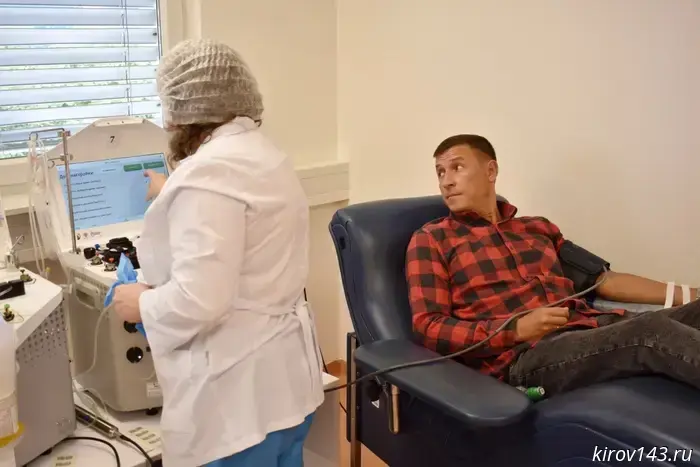 IK-6 staff member saved a person's life by becoming a stem cell donor.
The duty officer assistant to the head of the institution, Alexander Buldakov, was awarded the "For Assistance to the Donation Movement" medal.
IK-6 staff member saved a person's life by becoming a stem cell donor.
The duty officer assistant to the head of the institution, Alexander Buldakov, was awarded the "For Assistance to the Donation Movement" medal.
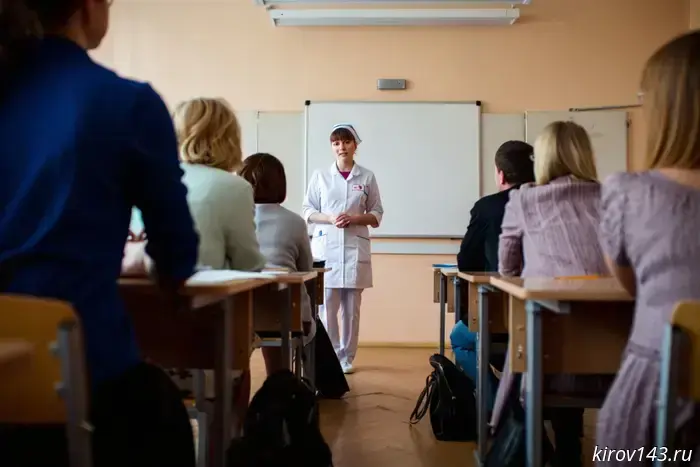 In the Kirov region, a nurse spoke about a child's illness at a school meeting.
The court fined an employee of the Arbash District hospital for disclosing a medical secret. The incident occurred during a school meeting.
In the Kirov region, a nurse spoke about a child's illness at a school meeting.
The court fined an employee of the Arbash District hospital for disclosing a medical secret. The incident occurred during a school meeting.
 Two trolleybus line breaks were fixed in Kirov.
The administration reported on today's incidents.
Two trolleybus line breaks were fixed in Kirov.
The administration reported on today's incidents.
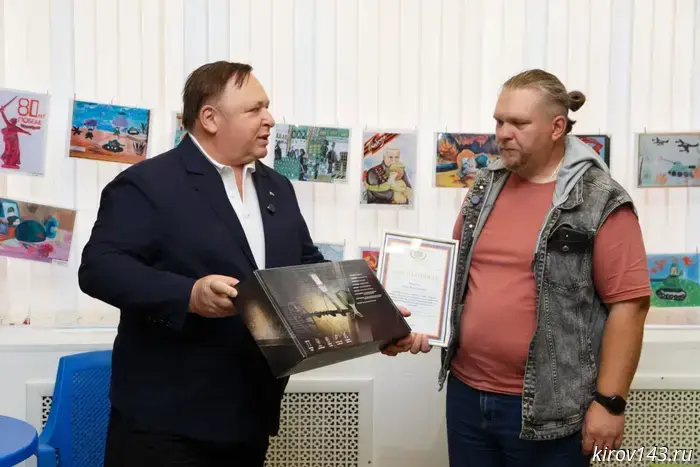 Oleg Valenchuk awarded the Kirov search enthusiasts
On July 1, State Duma deputy Oleg Valenchuk met with young tour guides and the commander of the "Risk" search squad Ilya Livatov at the Marshal Konev Museum as part of the regional week.
Oleg Valenchuk awarded the Kirov search enthusiasts
On July 1, State Duma deputy Oleg Valenchuk met with young tour guides and the commander of the "Risk" search squad Ilya Livatov at the Marshal Konev Museum as part of the regional week.
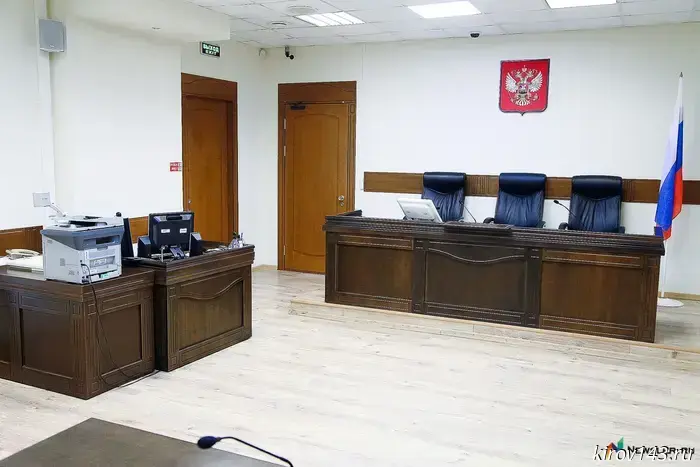 The verdict in the illegal migration case in Kirov has been upheld.
A 28-year-old Syrian citizen convicted of organizing illegal migration of 45 people through Kirov was unable to contest the verdict. The appeal was dismissed.
The verdict in the illegal migration case in Kirov has been upheld.
A 28-year-old Syrian citizen convicted of organizing illegal migration of 45 people through Kirov was unable to contest the verdict. The appeal was dismissed.
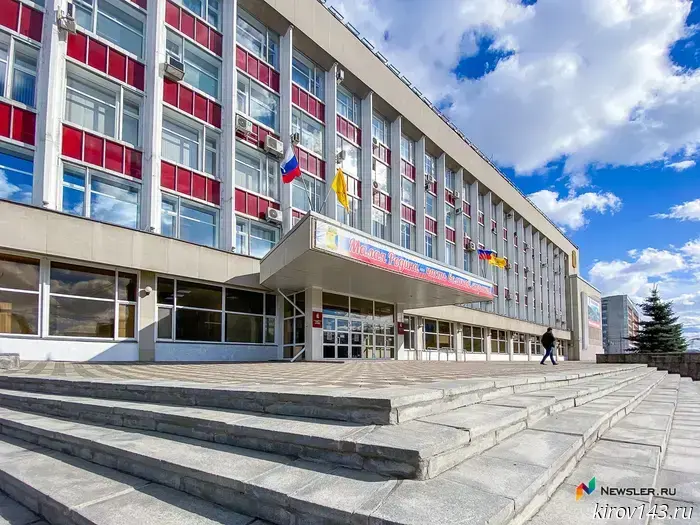 Officials gave Kirov residents a 'circumcision': the "h" disappeared.
The renaming of several Kirov streets, which was carried out without the consent of most residents of the city, was done incorrectly, further confusing and outraging Kirov residents.
Officials gave Kirov residents a 'circumcision': the "h" disappeared.
The renaming of several Kirov streets, which was carried out without the consent of most residents of the city, was done incorrectly, further confusing and outraging Kirov residents.
Kirovsk Sports Club left "headless": Vinogradova was forced into retirement
On July 1, Vladimir Putin signed a decree dismissing Andrey Vinogradov from his position as head of the Kirov Investigative Committee, who assumed his duties on December 6, 2019.
